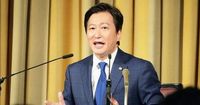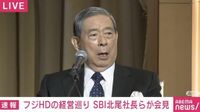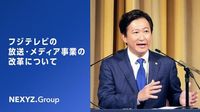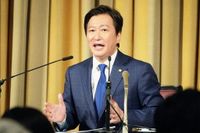In a bold move aimed at revitalizing Fuji Television, Dalton Investments, a U.S. investment fund, has announced it will submit a shareholder proposal during the upcoming general shareholders meeting in June 2025. The proposal focuses on electing new directors to spearhead management reforms at Fuji Media Holdings, the parent company of Fuji Television. This initiative comes at a time when the Japanese media landscape is facing significant challenges, prompting calls for innovative strategies to enhance the station's competitiveness.
On April 17, 2025, SBI Holdings Chairman and President Yoshitaka Kitao held a press conference, where he was joined by Taizo Kondo, President and Group Representative of NEXYZ.Group, who is also among the candidates proposed for directorship. Kondo emphasized the need for thorough discussions with the talented staff at Fuji Television to explore what is working, what is not, and how improvements can be made. Kondo stated, "There are many capable people within the company who are genuinely passionate about making significant changes and love Fuji Television. I believe we can achieve far better results through open discussions with them than through the plans I present today."
Kondo pointed out that Fuji Television has been overly focused on maintaining the status quo rather than pursuing a harmonious relationship between traditional television and the internet. He expressed concern that the station has not fully leveraged its substantial intellectual property (IP) to adapt to the evolving digital landscape, leading to a stagnation of its content value. He noted, "The fear of complaints from sponsors and viewers has diluted the excitement that comes with creating engaging content. We need leadership that can make swift decisions to embrace new ideas."
To address these challenges, Kondo proposed several key reforms aimed at integrating terrestrial broadcasting with digital platforms. He advocated for a more aggressive online expansion and a reassessment of the advertising structure to prioritize national clients while creating programming that puts viewers first. Specifically, he suggested re-editing and re-producing Fuji Television's archive of drama, variety, and documentary content for video services and social media platforms, thereby introducing a strategy to 'open up' the station's IP.
As part of this initiative, Kondo proposed the formation of an 'IP Remix Team' composed of young creators. This team would focus on revitalizing past assets to align with current trends and develop content specifically for online audiences, aiming to generate new advertising revenue streams. He also called for an 'offensive editing rights' approach, where content evaluation would emphasize metrics like audience engagement and social media sharing, rather than simply balancing positive and negative feedback. Additionally, he suggested empowering young producers by allowing them to create one prime-time program per year, fostering a culture that welcomes creative challenges.
Other innovative ideas presented during the press conference included a collaborative forum with industry veterans from platforms like Netflix, YouTubers, and popular influencers from Generation Z, tentatively named the 'Game Change Idea Conference.' Kondo also proposed establishing a 'Production Workshop Fund' that would allocate budgets and discretion to new program ideas sourced from both internal and external stakeholders, as well as participatory projects where viewers can contribute ideas through voting.
Kondo emphasized the importance of evolving the relationship with production companies, suggesting a shift from a subcontracting model to a co-creation partnership. This would involve openly reviewing proposals from production companies and investing resources into promising projects, with an eye toward expansion into Asian markets.
At the conclusion of the press conference, Kondo expressed optimism about the potential impact of these reforms, stating, "If we can make these decisions, I believe we can not only secure the future of our station but also update the entire media industry in Japan. This is a role that only Fuji Television can fulfill." He reiterated his commitment to engaging with those at Fuji who are eager to innovate, inviting them to collaborate in discussions about the future of the station.
Amidst these developments, NEXYZ.Group has begun airing television commercials on both Fuji Television and Okinawa's Ryukyu Broadcasting, despite a decline in ad placements at Fuji. Kondo explained that choosing to promote on a platform undergoing significant change reflects the company's commitment to innovation and creating new value, rather than waiting for a more stable environment.
The upcoming shareholders meeting is set to play a crucial role in determining the future direction of Fuji Television, as the proposals from Dalton Investments and the insights from Kondo and other candidates could lead to a significant transformation within the company. As the media landscape continues to evolve, the decisions made in June will likely resonate throughout the industry, highlighting the urgent need for adaptation in an increasingly digital world.




